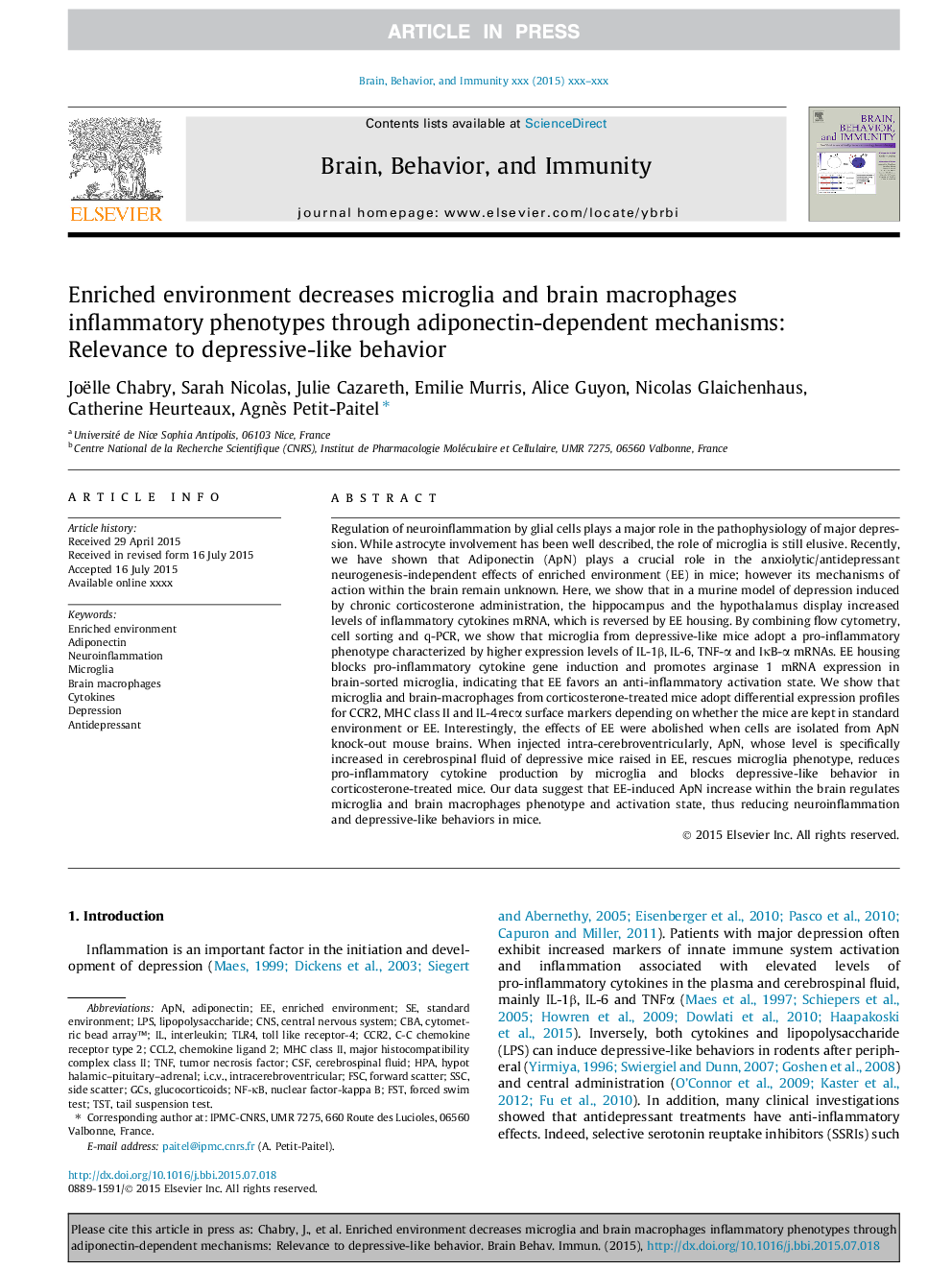| کد مقاله | کد نشریه | سال انتشار | مقاله انگلیسی | نسخه تمام متن |
|---|---|---|---|---|
| 7280734 | 1473917 | 2015 | 13 صفحه PDF | دانلود رایگان |
عنوان انگلیسی مقاله ISI
Enriched environment decreases microglia and brain macrophages inflammatory phenotypes through adiponectin-dependent mechanisms: Relevance to depressive-like behavior
ترجمه فارسی عنوان
محیط غنی شده باعث کاهش میکروگلاییا و ماکروفاژ مغزی فنوتیپ های التهابی می شود از طریق مکانیزم های وابسته به آدیپونکتین: مربوط به رفتار افسردگی
دانلود مقاله + سفارش ترجمه
دانلود مقاله ISI انگلیسی
رایگان برای ایرانیان
کلمات کلیدی
SSCFSTintracerebroventricularCBAi.c.v.TSTGCsCCR2C-C chemokine receptor type 2FSCAPNTLR4CCL2LPSTNFNF-κBMHC class II - MHC کلاس IIadiponectin - آدیپونکتینTail suspension test - آزمون تعلیق دمforced swim test - آزمون شناور اجباریDepression - افسردگیNeuroinflammation - التهاب عصبیinterleukin - اینترلوکینCNS - دستگاه عصبی مرکزیCytokines - سیتوکین هاcentral nervous system - سیستم عصبی مرکزیAntidepressant - ضدافسردگیtumor necrosis factor - فاکتور نکروز تومورNuclear factor-kappa B - فاکتور هسته ای-کاپا Blipopolysaccharide - لیپوپلی ساکاریدchemokine ligand 2 - لیگاند شیمیایی 2Toll like receptor-4 - مانند گیرنده -4Brain macrophages - ماکروفاژهای مغزCSF - مایع مغزی نخاعیCerebrospinal fluid - مایع مغزی نخاعیstandard environment - محیط استانداردEnriched environment - محیط غنی شدهHPA - میلی بار یا هکتوپاسکالMicroglia - میکروگلیاهاhypothalamic–pituitary–adrenal - هیپوتالاموس-هیپوفیز-آدرنالforward scatter - پراکندگی رو به جلوside scatter - پراکندگی سمتMajor histocompatibility complex class II - کلاس پیچیده بافتی عمده IIGlucocorticoids - گلوکوکورتیکوئیدها
موضوعات مرتبط
علوم زیستی و بیوفناوری
ایمنی شناسی و میکروب شناسی
ایمونولوژی
چکیده انگلیسی
Regulation of neuroinflammation by glial cells plays a major role in the pathophysiology of major depression. While astrocyte involvement has been well described, the role of microglia is still elusive. Recently, we have shown that Adiponectin (ApN) plays a crucial role in the anxiolytic/antidepressant neurogenesis-independent effects of enriched environment (EE) in mice; however its mechanisms of action within the brain remain unknown. Here, we show that in a murine model of depression induced by chronic corticosterone administration, the hippocampus and the hypothalamus display increased levels of inflammatory cytokines mRNA, which is reversed by EE housing. By combining flow cytometry, cell sorting and q-PCR, we show that microglia from depressive-like mice adopt a pro-inflammatory phenotype characterized by higher expression levels of IL-1β, IL-6, TNF-α and IκB-α mRNAs. EE housing blocks pro-inflammatory cytokine gene induction and promotes arginase 1 mRNA expression in brain-sorted microglia, indicating that EE favors an anti-inflammatory activation state. We show that microglia and brain-macrophages from corticosterone-treated mice adopt differential expression profiles for CCR2, MHC class II and IL-4recα surface markers depending on whether the mice are kept in standard environment or EE. Interestingly, the effects of EE were abolished when cells are isolated from ApN knock-out mouse brains. When injected intra-cerebroventricularly, ApN, whose level is specifically increased in cerebrospinal fluid of depressive mice raised in EE, rescues microglia phenotype, reduces pro-inflammatory cytokine production by microglia and blocks depressive-like behavior in corticosterone-treated mice. Our data suggest that EE-induced ApN increase within the brain regulates microglia and brain macrophages phenotype and activation state, thus reducing neuroinflammation and depressive-like behaviors in mice.
ناشر
Database: Elsevier - ScienceDirect (ساینس دایرکت)
Journal: Brain, Behavior, and Immunity - Volume 50, November 2015, Pages 275-287
Journal: Brain, Behavior, and Immunity - Volume 50, November 2015, Pages 275-287
نویسندگان
Joëlle Chabry, Sarah Nicolas, Julie Cazareth, Emilie Murris, Alice Guyon, Nicolas Glaichenhaus, Catherine Heurteaux, Agnès Petit-Paitel,
